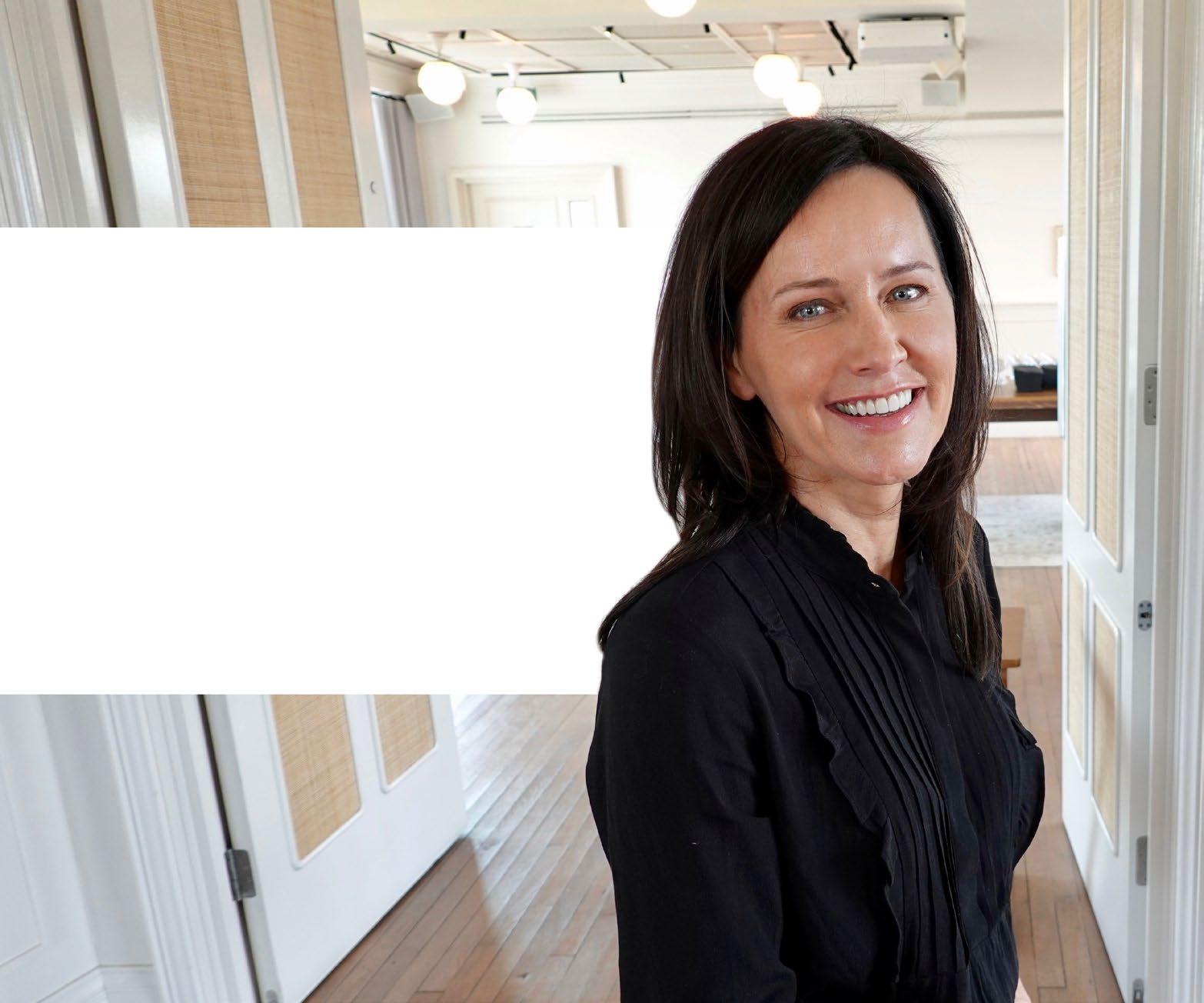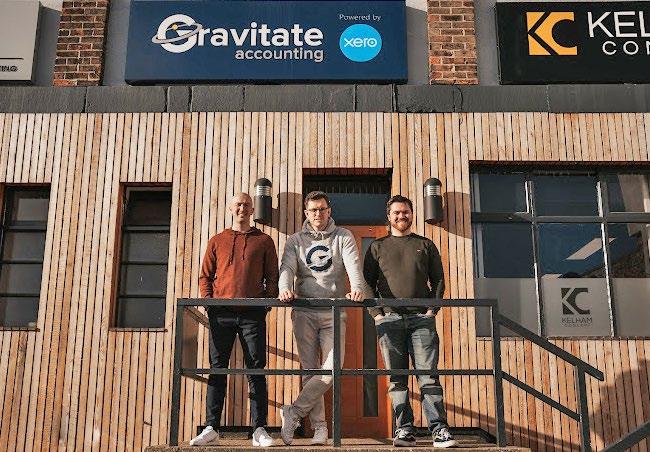Funding your SME: how to boost cashflow, grow your business and overcome economic challenges

FIND BUSINESS FUNDING WITH SWOOP.
Swoop can help you keep your cashflow healthy through:
Giving you access to grants, loans, equity and property finance; Making savings on everyday costs such as banking, foreign exchange and utilities;

Helping you get a better deal by refinancing existing loans.
Swoop offered a superb service overall.. We were assigned a dedicated Accounts Manager by Swoop who got our loan approved in 5 days and the money was in our account shortly afterwards.
Sign up for free and discover your funding options:
0203 868 0364
hello@swoopfunding.com swoopfunding.com
ADNAN N, SMALL BUSINESS OWNER
Welcome
TIMES ARE TOUGH, there’s no doubt about that. But the supplement you’re reading holds the key to helping your business grow in the months to come.
We’ll be taking a deep dive on Swoop, an online platform that helps organisations like yours every day. And by the time you’ve finished reading, we think you’ll want to jump in and explore the possibilities for yourself.
Until recently, SMEs in search of a cash boost faced a daunting task. That’s all changed as a result of Swoop bringing together ground breaking technology, human expertise and ability to access more than 1,000 funding providers.
At a time when costs are going up and businesses are under more pressure than ever, Swoop’s aim is to help you emerge from these challenging times in better financial shape.
Across the UK, SMEs are struggling. Traditional high street banks, vulnerable to changes in the economy, are increasingly reluctant to provide loans.
Alternative lenders are numerous, however–and Swoop’s mission is to quickly highlight the products and services that will help you protect your cashflow.
Putting all the most relevant offers in one place, Swoop will also ensure your needs are met with the best deal possible.
Swoop prides itself on its relationships with customers, and in
the pages that follow, you’ll read about firms that it has revitalised or saved from financial calamity.
Every day, customers tell Swoop where their pain points lie. In response, its team of experts identifies the solutions they need.
If one customer tells them about a problem, it’s almost certainly the case that thousands of others will be in the same boat.
Another of Swoop’s hallmarks is that it goes the extra mile. Indeed, customers often remark that it pulls out all the stops on their behalf.
Read on to learn how team members have gone above and beyond the call of duty, proving just how much they care about helping customers in their hour of need.
Throughout this supplement, we’ll give you examples of the solutions at Swoop’s disposal–solutions designed to help your business thrive.
We’ll give you feedback from Swoop’s customers about how they feel about the market right now, and we’ll introduce you to the team whose dedication saw the company win a prestigious New Statesman Positive Impact Award.
From grants to loans to equity, we’ll explain everything you need to know about the funding landscape.
And as Swoop’s reputation grows in the months and years ahead, you might even find yourself meeting your funding issues with the phrase: “Need it? Swoop it!”
3 SWOOPFUNDING.COM
Contents 04 The inside story of Swoop 07 Funding Timeline Infographic 08 When the banks say no 11 Meet the team 12 A piece of the action 16 Case Study - Gravitate Accounting 17 Case Study - Grub Club Dog Foods 18 Don’t dream it, Swoop it! Swoop
The inside story of Swoop
From the heart of Ireland to Downing Street and beyond, Andrea Reynolds has been on a remarkable journey. Now, with the economic crisis set to continue the lessons she’s learned are helping SME owners take their businesses to the next level

WHAT SORT OF influences mould
a chief executive’s character? In the case of Swoop’s co-founder, Andrea Reynolds, intergovernmental relationships and pet food rank highly on the list.
When Andrea was at university in the 1990s, her father Albert was the Republic of Ireland’s taoiseach. “John Major was prime minister here in the UK,” she says, “and collectively they worked on the ceasefire in Northern Ireland. It was an incredibly interesting time, seeing how really it came down to human relationships and trust. I think it’s pretty much the same in business.”
By this point, she’d already set her heart on a career in business and accountancy, inspired by the family’s manufacturing operation in Ireland. “They supplied pet foods to stores like Sainsbury’s and Tesco, and I watched
that grow from something so small to something so large. It was exciting to see what it did for employment, and for the town, so I think that’s where I got the bug for business from.”
Her particular interest in SMEs came later, after she’d trained with KPMG. With experience gained in the accountancy giant’s London office, she set up her own corporate finance firm. This brought her into contact with spinout companies from Formula 1, “and working with those types of innovative businesses, I would look at grants for them. I would look at R&D
tax credits, getting loans for when they needed to acquire assets.
“It was there that I learned some universal truths about how difficult it is for a business to navigate the funding landscape. Not every business can afford a corporate finance advisor and I just thought, ‘This model is a bit skewed.’”
Groundbreaking research
Andrea’s eventual solution, Swoop – a technological platform that would scour the funding landscape on SMEs’ behalf, bring up the best deals in
SWOOPFUNDING.COM 4
Andrea Reynolds
moments and provide backup in the form of human advisors – was by no means fully formed at this stage. A visit to Downing Street, this time when David Cameron was in charge, helped push the idea forward in 2016.
Utilising her talents as an auditor, she’d researched the UK’s system of awarding grants “and I discovered a lot of things that were going wrong”.
As it turned out, 71% of businesses had never applied for grants, and funds that had been allocated hadn’t been distributed. “It was costing the government almost £1 million pounds per job created,” she says.
“I got an opportunity to present that in Downing Street and they said, ‘This is a great piece of research. If you could build something to solve a lot of these problems, that would significantly help UK SMEs.’ I got a lot of confidence from that, and then I decided to build a prototype.”
Potential customers responded warmly. At the same time, developments such as open banking, cloud accounting and the ability to pull data from Companies House made the concept even more compelling.
“My prototype was built before open banking launched in 2018, but what open banking is doing is really significantly improving the experience,” says Andrea. “It’s speeding up the ability to get financed. It is being used more and more by lenders to actually make lending decisions, and so it truly is digitising a lot of what was a manual process.
“It’s also giving back insights to business owners on what lenders are looking at. Rather than you waiting to hear what the lenders think of your

bank statements and what’s going on, we return that information to you, so you start to think like a lender and you start to think like a funder. You’re not intimidated by the process of when and how to go for funding. It’s a very powerful tool.”
A great deal of credit
When Andrea started her corporate finance firm, funding options were limited to high street banks and a tiny number of asset finance and invoice finance providers. “That was it. That was the market. Now you have hundreds of providers.”
She reels off several examples –fixed-term loans for three or six years, asset finance that ranges from £100 to millions of pounds – and discusses a newer innovation, revenue-based financing. “If you get your sales through credit card terminals or through your ecommerce platform, they will give you a loan and they will just deduct a percentage off your sales until it is repaid. If you have a bad month of sales, they’re only taking a small percentage of your sales from that month – so, lots of flexibility.
“The UK has the largest business finance market in the world outside of the US. Even with the volatility in the market, there is still a lot of credit to be distributed. That is the fundamental difference between the financial crisis we’re going through and the 2008 recession. In 2008, there was no liquidity in the market, no finance available whatsoever for businesses. This time around there is.
“It’s a very different crisis. It’s an energy crisis. It’s a supply chain crisis. It’s inflation. But it’s not a liquidity crisis.”
5 SWOOPFUNDING.COM
Swoop
Not every business can afford a corporate finance advisor and I just thought, ‘This model is a bit skewed.’
Andrea Reynolds
customer,” says Andrea. “It was coming to the end-of-month payroll, [the boss] didn’t have the cash to meet it, and we were able to get him an immediate cash injection into the business, an immediate loan.”
“He left us a message saying, ‘All of my employees have gone home tonight not realising how much stress I was under to meet that payroll. Thank you for saving not just me, but my employees this month.’”
The nuts and bolts
In practical terms, then, how do small business owners use the Swoop platform?
“They come on and they build their profile like it’s LinkedIn,” says Andrea.
“Just from you putting in your company name, we have pulled your data from Companies House, so you don’t have to go there and download the files and then pass them over to a lender. We’ve done that heavy lifting for you.
“Then we need you to tell us more about the finances of the business. Rather than filling out a long form, you can log in and allow us to pull the data from your cloud accounting software. We’re then able to produce the set of accounts immediately that the lenders want to see.”
Likewise, to save you the bother of downloading bank statements for the lender to look at, you can log into your bank account and give Swoop the read access to pull that data immediately.
“Within minutes, we are matching that against the lending criteria of lenders, of grant agencies that have grants available, etc. And we are saying to you, based on your numbers and your profile, here are the products that you are currently eligible to apply for, here are the amounts that you
could apply for and here’s the typical cost of that finance.”
A further advantage is that all your details are now stored on Swoop’s system. This means that if you want to apply to Bank A, then decide you’d rather approach Bank B, the process won’t be remotely difficult or drawn out.
“Alongside that, we have a team of experts that talk you through the next stages – why you should consider one over the other – so you make a very informed decision,” says Andrea.
To be clear, Swoop makes its money from the providers, not the SMEs seeking funds. “We all know that when we take out a mortgage or a loan, whether it’s business or personal, there’s an arrangement fee. Providers now share that fee with platforms like Swoop, because we have done a lot of the work for them. We’ve basically lightened their load.”
Success stories
Swoop is going from strength to strength, but the most satisfying part of running it is seeing the profound difference it makes to SME owners’ lives.
“An example that really sticks out was when a fantastic business suddenly wasn’t paid by their largest
Another business won a massive contract that meant it had to build a new plant in northern England. “We were able to get them not just the private finance for the plant, but we married it with a grant as well, which significantly reduced the project cost and the cost of the entire fit-out for the factory,” says Andrea.
“In general, we see businesses from start-ups, right through their growth, and we’ve had known brands like Nimble Babies [which makes childfriendly cleaning products] and Holy Moly Guacamole. If you walk into any supermarket today, you will see them on the shelves.
“We help them from getting the first production run done to seeing them grow spectacularly across the country, year on year. That’s something I’m incredibly proud of.” Happily for its 80 staff, Swoop itself is a standout Swoop success story, growing 450% in the past year alone. The firm, based in London, Dublin, Toronto and Sydney, describes itself as its own best case study, drawing on grants, borrowing, R&D tax credits and, recently, £5.4 million in Series A funding.
“Every stage of finance that we recommend to our customers, we have been through that journey,” says Andrea. “So, everything we offer is tried and tested by Swoop itself.”
SWOOPFUNDING.COM 6
We were able to get them not just the private finance for the plant, but we married it with a grant as well
Debt products
Start-Up Loan
Recovery Loan Scheme 3
Commercial Mortgage
Asset Finance
MCA
Selective Invoice Finance
Unsecured Term Loan (AF)
VAT Loan
Revolving Credit Facility
Unsecured Term Loan (Bank)
Venture Debt
Trade Finance
MBO / MBI
7 SWOOPFUNDING.COM Swoop
Pre Revenue Early Growth Expansion Growth Mature Growth of company
Available source and scale of funding
When the banks say no
Failing to get a high street bank loan isn’t the end of the world. Plenty of other options are available, as Swoop’s specialists explain
YEARS AGO, ENTREPRENEURS who wanted a loan didn’t have much choice in the matter. As a rule, the decision rested with their high street bank manager.
These days, however, the landscape has changed radically. The big-name banks aren’t quite so interested in SMEs – but a wide range of alternative lenders are.
The old-fashioned model, which normally requires collateral in the form of property, has diminished in importance, according to Rhys Cunnah, Swoop’s head of unsecured debt.
“Usually, traditional banks have had the first point of relationship with opening a business,” he says. “To function as a business, you need a business bank account, which is typically where the main source of SME funding has been placed.
SWOOPFUNDING.COM 8
When the banks say no
“Now, there are many bespoke products that aren’t necessarily offered by a mainstream bank, and these include a variety of products that potentially don’t require bricks and mortar.
“They can be for sector-specific products, they can be for a short duration, they can be for the long term, and they can be much more bespoke in terms of the guarantees that are needed. There’s a lot of challenger funders, or lenders in the market that offer much more competitive terms than we’re seeing from the traditional banks.
“The appetite from the high street bank has shrunk, so you can no longer walk into your local branch and see your bank manager. Usually for SMEs, you speak to someone in a call centre over the phone. And in any case, there’s a much bigger opportunity outside of mainstream banking.”
The list of alternatives is long and varied – but for the moment, let’s run through some of the more popular and innovative options.
Grants
Before you try borrowing, it might be worth applying for a grant. “If you’re on Swoop, you can check the whole UK market to see which grants are available to you,” says Swoop’s head of equity, Neil Dillon.
“The application might take the form of a competition, and these can be quite onerous. You have to put in some money to begin with, or some time and effort to write a good application.
“But at the end of the day, you’re not giving away any of your business, you’re not strapped with debt after it and you’ve got a huge cash injection for nothing, really.”
Start-up loans
Another popular choice is the government-backed start-up loan,
worth between £500 and £25,000 per director. With a maximum of four business partners, that’s up to £100,000 in total.
The loans are unsecured and designed to pay for concepts, testing, designs, prototypes, machinery, plans, legal needs, premises, marketing, staff costs and more. Their ultimate aim is to bring a seed or early-stage business to life.
Start-up loans can be repaid over a period of one to five years at a fixed interest rate of 6% per year.
VAT loans
SMEs use VAT loans to pay off HMRC’s quarterly VAT demand. “What these do is split the cost across three, six, nine or 12 months,” says Rhys.
“It means that HMRC are being paid ahead of any other creditors that the SME may have.”
The sum you can borrow, ranging from £5,000 to £5 million, will depend on your eligibility and your business’s unique circumstances. The typical APR for borrowers with good eligibility is 2.9% at present.
Merchant cash advance (MCA)
This relatively new form of loan suits businesses with a high volume of card payments. Essentially you borrow a lump sum, which you then repay as a fixed percentage of customer card receipts.
“It’s great for seasonal stock,” says Rhys. “So, if you are a corner shop and you want to purchase stock for Christmas, the lender will take a percentage of future sales.”
A variety of factors, such as your turnover, industry sector, business credit rating and volume of card receipts, determine the cost of borrowing. This typically ranges from 7p to 35p per £1.
Revolving credit facility
A revolving credit line is rather like a flexible, open-ended loan.
This means you can borrow cash, pay it back, borrow some more and so on, for the agreed duration of the term.
The maximum you can withdraw is usually equal to your business’s monthly turnover.
9 SWOOPFUNDING.COM
Swoop
Revolving credit facilities provide a fast, flexible form of funding that doesn’t require security and works out much cheaper than a business credit card. On the downside, they are shortterm and charge higher interest rates than fixed business loans.
Unsecured business loans
If your business lacks assets, you may want to consider an unsecured facility – one that doesn’t require collateral, in other words. Secured loans, by contrast, are the stock in trade of high street banks.
Unsecured loans from less traditional lenders are usually more expensive and depend on your business profile –that is, your trading history, turnover and credit score. They are, however, quicker and cheaper to arrange than the secured type.
“We’re seeing more lenders come to the market where there is less need for the trading history,” explains Rhys. Companies that have traded for as little as three or six months may be eligible.
R&D tax credits
R&D tax credits encourage businesses to invest in research and development. The scheme allows a proportion of a company’s R&D spend to be recovered as either a reduction in corporation tax or as a cash payment.
HMRC’s broad definition of R&D projects includes investment into
technology, IT systems, data and cloud computing. Indeed, sectors as varied as agriculture, construction, engineering, architecture, food and cloud computing could qualify.
The last word
A common mistake that SMEs make is to lose heart and give up when their high street bank refuses them a loan.
“We do deal with the high street banks when there is a high street bank deal, but many funding options aren’t available from them,” says Rhys. These banks in particular “do like bricks and mortar”, he notes.
His advice is to consult a specialist about exactly what you’re looking for. “Many brokers, many intermediaries and many bank managers may not know the ins and outs of every product,” he adds.
“At Swoop, we have specialist divisions – whether that be asset finance, unsecured lending, commercial mortgages, equity investment or grants - because we have such a broad range of options.”
To find out more, visit: swoopfunding.com
Focus on property
There’s a lot more to Swoop than just securing loans and grants.
Later on, we’ll be talking about equity. But as well as that, there’s property to think about.
If you’re looking for a commercial mortgage, Swoop can do the hard work for you.
Its experts will use all their experience and skill to present your deal to lenders in the best shape possible, opening up more options and reducing the interest you’ll be charged.
Commercial mortgages cover three scenarios:
• You’re a business that trades from and owns the property you wish to borrow money against.
• You’re a property owner who receives an income from a tenant or licensee.
• You own a portfolio of properties.
In every instance, Swoop’s specialist brokers are on hand to work with you and support you in your objectives.
It’s worth pointing out, however, that commercial mortgages have become harder to achieve in the current economic environment.
Swoop’s Rhys Cunnah cites contributing factors such as rising interest rates, inflation and business costs.
SWOOPFUNDING.COM 10
When the banks say no
Meet the team
Three key contributors to Swoop’s success
Ciaran Burke COO and co-founder
Ciaran graduated in business and economics from Trinity College, Dublin.
He began his career at KPMG Sydney as a senior market analyst, then became a management consultant in London, where his clients included EY, Intersport, Vodafone and Oakley. His passion for growing businesses and building a community around them took him to Hiive in 2013.
Ciaran oversaw the development and launch of Hiive.co.uk, the professional network for creative people, which now has over 150,000 registered members and 4,500 businesses on board. These include Google, the BBC, Facebook, Framestore, Channel 4, Penguin and Sony.
In 2018, he co-founded Swoop, overseeing its development and launch.
Stuart Pawelczyk Head of commercial mortgages
Stuart is an experienced SME and property finance professional. As director at Christie Finance, he drew on an in-depth knowledge of sectors such as healthcare, childcare, hotels, pubs, catering and takeaways, petrol stations and convenience stores.
His driving passion is to see business owners – from first-time buyers to real estate professionals –realise their property ambitions.
A commercial mortgage broker since 2014, he has overseen commercial mortgages and loans ranging from £25,000 to £15 million in value.
Skilled in negotiation, sales, management, financial risk, and business relationship management, Stuart operates independently of the banks to find some of the best deals available.
Sam Tasker-Grindley Head of Swoop for Advisors



Sam is passionate about helping business owners and accountants reach their potential and lead the best lives they can.
By day, he is a chartered accountant, heading up the rollout of Swoop to the accounting world. His objective is to help forwardthinking firms scale their funding advisory services and support more of their clients to grow their businesses.
By night, he is co-founder of Studenteer.co.uk, matching students with the charities and good causes that need them most.
Sam graduated from Cardiff University in 2011 and is vice president of the Institute of Chartered Accountants in England and Wales’s West Yorkshire and York group.
11 SWOOPFUNDING.COM
Meet the team
IF YOU’VE EVER watched the TV show Dragons’ Den, you’ll have an inkling of what raising equity investment is.. In layman’s terms, it’s handing over a chunk of your business in return for fresh capital.
“It’s the purchase of common shares within a company,” explains Swoop’s head of equity, Neil Dillon, “and these entitle the owner to a certain portion of the profits and assets.”
When a start-up seeks fundraising help, Swoop’s equity team starts by reviewing its slide presentation, known as a pitch deck. “And if we think we can help with that raise, and we have the right investor network for them, we’ll take them on as a customer,” says Neil.
In late 2022 investors were cautious and “tiptoeing into deals”, but in the first quarter of 2023 things have changed. “’We’ve seen funds who
A PIECE OF THE ACTION
How do you find the ideal funding partner? Swoop’s head of equity has the answers

have been sitting on cash, mandated by their limited partners to invest the money, so cheques have started to be written again”.
Hard questions
Before you commit to the process, however, Neil suggests examining your motives. Are you ready to raise equity investment, and do you really need to?
“Some founders register their company, start getting things in place and immediately think: ‘I need equity investment.’ Maybe it’s the influence of reading about venture capital,” he says.
“Yes, it’s true that you can grow
faster when you’ve got more capital behind you, but it’s not the only way to start a business and grow substantially.
“I would ask of a founder, ‘Are you ready to give away some of your business, to give away some of the control?’ An investor who expects a return might want to influence decisions.
“Also, are you ready to give away a part of the start-up’s profits when all goes well?”
To begin with, companies that wish to grow organically might be better off avoiding equity funding, Neil suggests. “When you use the operating cashflow and invest your profits back into the
SWOOPFUNDING.COM 12
A piece of the action
business, that’s called bootstrapping. “Lots of businesses have done this, and they can take venture capital money later on if they need it. But bootstrapping can really allow you to find that product market fit – to make sure you have a product that customers want without putting yourself under a lot of pressure.”
Friends and family
Grants and start-up loans, discussed elsewhere in this supplement, are options too. So is persuading friends and family to invest.
“This can be anywhere between £10,000 and £150,000. A high proportion of our businesses have taken on some sort of family and friends’ money before they look to raise from an institution or an angel
investor,” says Neil.
Nonetheless, he recommends “keeping it professional” and using proper documentation in these circumstances. “Detail the risks that are involved, as they may not realise exactly what they are getting into,” he adds. “Start-ups sound great, but most fail in reality.
“Also, don’t give away too much of your business too early, because then your capitalisation table won’t look very attractive for investors later on in different rounds.”
Angel delight
Angels and high-net-worth investors are the next place start-ups might look, says Neil.
“Again, these might be within your immediate network, or you might get an opportunity to pitch to an angel syndicate. There might be pitch nights with angels in the audience.
“There are many angels out there. Often they are ex-founders themselves, or they know a certain industry very well.
“The big benefit I’ve found with angel investors is that they can write a cheque much faster than a venture capital (VC) fund can. It’s their own money, so if they really like you and your idea, they might write your cheque after a week of due diligence –or on the spot.”
Venture capital
VC funds are a huge part of the fundraising network, frequently highlighted in the media. Major international examples include Sequoia, LocalGlobe, Index Ventures and Andreessen Horowitz.
The jargon-buster
TAM: Total Addressable Market –total market demand for a product or service
SAM: Serviceable Addressable Market – the segment of the TAM targeted by your products and services
SOM: Serviceable Obtainable Market – the portion of SAM that you can capture
EBITDA: Earnings Before Interest, Tax, Depreciation and Amortisation
VC: Venture capital – a form of private equity
VCT: Venture Capital Trust – private equity funds whose shares trade on the London stock market
CGT: Capital Gains Tax – tax on the profit when you sell something (an ‘asset’) that has increased in value
Advance Assurance – provisional confirmation from HMRC that the investment made into a company will be eligible for tax relief

Runaway – the amount of time a business has to remain solvent, provided they don’t raise any additional funds
Run rate – the financial performance of a company, using current financial information as a predictor of future performance
Burn rate – shows how much money a company uses before it starts generating income
13 SWOOPFUNDING.COM
Swoop
“These guys are the big funds, but there are many, many funds that are global, European or UK-based and we have a large network of them within Swoop that we try and keep warm.
“We make sure that they’re seeing all the best deals that are available in the market that we have for them and giving our founders the opportunity to get in front of them,” says Neil.
In addition, many funds have been set up to take advantage of two government tax schemes, the Seed Enterprise Investment Scheme (SEIS) and the Enterprise Investment Scheme (EIS).
“The SEIS scheme allows a start-up to take £250,000 of investment within three years of their first commercial sale, then the investor can write off 50% against their tax bill that year. They’ll also pay no capital gains tax, and no inheritance tax, on the profit from their investment.
“EIS, the big brother of SEIS, allows a business to take on £5 million within any given year, or £12 million over the lifetime of a business. They just need to take in those funds within seven years of their first commercial sale.
“These two schemes have been a huge benefit to the UK ecosystem, with loads of funds starting up to take advantage of them.
“It’s one of the reasons why the UK is so far ahead of other European
countries in the start-up space.”
Some VC funds, such as the Midlands Engine Investment Fund and the Northern Powerhouse Investment Fund, invest in individual UK regions. The advantage for businesses based there is that “you reduce your competition to that specific region. So, you may be competing with just a handful of other start-ups that are within your sector.”
The wisdom of crowds
Elsewhere, family offices that traditionally concerned themselves with property and retail have become major investors in tech start-ups, says Neil. “They can be hard to get in front of because they don’t publicise themselves as much as a venture capital fund would. But Swoop has them within our network.”
You may well have heard of crowdfunding too. The platform best known to the public, Kickstarter, enables fans to finance creative projects by clubbing together in their thousands.
As far as Swoop is concerned, the two main players to watch are Seedrs and Crowdcube. “Unlike Kickstarter, here you are giving away equity. It’s great for consumer businesses,” says Neil.
“You don’t just go live on these platforms without having some of the investment already committed,
because sitting there with 0% invested doesn’t get the FOMO, the fear of missing out. But crowdfunding can be an absolutely brilliant way to raise the funding you need and get great publicity.”
How to succeed
All in all, then, what do SMEs need to know about raising capital?

“Realistically, it will take three to six months to raise institutional investment,” says Neil. “Make sure you’re really willing to give time to the fundraising. That’s where Swoop can help, by giving you some of that time back and doing the investor outreach for you.
“You’ll also need a well-designed, well-presented pitch deck so that you’re giving all the key aspects of your business. We have an ideal Swoop pitch deck template you can use.
“And founders should understand their finances. We’ve all seen Dragons’ Den, when the dragons ask about financial projections and people fall to pieces.
“For the most part, you want to show product market fit – that is, your product satisfies a strong market demand. Maybe you’ve done some research to show there’s a problem and you’re the one to solve it.
“Finally, get to know the investors and choose wisely. This is also where Swoop can help, by finding those right investors. You need to see it as a partnership, because they’re going to be a part of your business for several years to come. Make sure there’s a trust there and that they’re adding value.”
To find out more, visit: swoopfunding.com
SWOOPFUNDING.COM 14
DON’T LET CASH FLOW STAND IN THE WAY OF RUNNING YOUR BUSINESS.

Swoop can help you keep your cashflow healthy through:
Giving you access to grants, loans, equity and property finance;
Making savings on everyday costs such as banking, foreign exchange and utilities;
Helping you get a better deal by refinancing existing loans.
Sign up for free and discover your funding options:
After being directed to Swoop by Santander for the setting up of a small business loan I couldn’t have found a better equipped company. Rhys Cunnah guided me through the process and was there to answer any queries whenever needed. Superb service.
0203 868 0364
hello@swoopfunding.com swoopfunding.com
RAY N, SMALL BUSINESS OWNER
Another string to their bow
With Swoop’s help, Sheffield’s Gravitate Accounting turned tracking down funding for clients into a selling point

CALL ON THE offices of Gravitate
Accounting and the last thing you’re likely to see is a pinstripe suit. At this thoroughly modern firm, the 10 members of staff would rather wear hoodies and merch.
“We’re probably a pretty perfect target client for Swoop because we’re a new, up-and-coming digital accountancy practice,” says Sam Newton, who founded the Sheffield company three years ago.
The practice is “quite hands on” with its couple of hundred clients, he adds. “We don’t just do a set of accounts. We’re in contact with them monthly, producing reports, KPI reports, management accounts and so on.
“At some point, they’ll have a need
for cash. Historically, what we’d probably have had to do is speak to their bank, speak to [commercial lender] Funding Circle, speak to a number of other lenders and try to find them a good deal.”
That’s all changed since Gravitate started using Swoop last year. “We’ll say, ‘We’ve got a client who wants to borrow money for X, Y and Z,’ at which point Swoop will scour the market to find the best funding available.”
Sam cheerfully admits that he and his colleagues used to dread the thought of clients asking: “Can you help me find some funding?” The question placed them in an awkward predicament.
“As a smallish firm, we didn’t have
that resource in house. Do you say you’ll charge them £100 an hour or whatever? And if you don’t find them any funding, can you really bill them?
“Now we just upload all their information on to a portal that Swoop provides, giving them everything they need to approach various lenders. With their in-house knowledge, Swoop can target specific lenders and come back with options for our clients.
“One of the deals I did, I just put them in touch with Swoop, because instead of being the middleman, the go-between, we’ve got a good enough relationship and trust in the guys at Swoop for them to run the conversation and do the best by our clients.
“So, it’s gone from being a ‘what do we do if that happens?’ to ‘yeah, we’ll happily help’. And we’ve got a really good solution in place where we can hopefully get some pretty quick answers.”
All in all, Swoop’s service represents another string to Gravitate Accounting’s bow, according to Sam. “Whenever we land a deal, we promote it on our social media and it gets people talking to us. They say, ‘Oh, I’ve tried through my bank and I’m struggling to get money. Can we have a conversation about how you can help us generate funds?’
“All the people we’ve dealt with at Swoop have been really good people. And the opportunity to add new services has been great for my business,” he says.
SWOOPFUNDING.COM 16
CASE STUDY - GRAVITATE
ACCOUNTING
Gravitate Accounting
‘There’s a serious opportunity here’
With venture capital funding, a classroom project to develop eco-friendly dog foods made the leap into the commercial realm
is gathering massive momentum globally, especially in markets like pet food, aquaculture and livestock feed,” says Alessandro.
“We spent the tail end of 2020 and the best part of 2021 understanding the market, surveying as many customers or potential customers as possible and understanding their perceptions of insect protein.
“All of this is great, but without the money to launch a business, it would just remain a classroom project. Then we realised, ‘There’s a serious opportunity here – I’m going to need to raise some capital to bring this business to life.’
“I’m fortunate enough to have a network in the UK, but most of my network is back home in South Africa, so raising capital here was a daunting task.”
OFFERING YOUR DOG a nutritional superfood made from insect protein instead of conventional meats has a number of surprising benefits.
Firstly, it’s fantastic for the environment. Given that livestock farming helps to drive deforestation and climate change, it’s sobering to learn that pets consume a fifth of the world’s fish and meat.
What Grub Club’s co-founders didn’t initially realise, however, was just how dramatically their products would transform the lives of the dogs themselves. That’s because canine allergies are common and are often linked to eating beef, chicken and similar foodstuffs.

“Some of the testimonials we share online are just amazing,” says Alessandro Di Trapani, who co-founded Grub Club with trained chef Hugh Petit.
“A customer told us that her dog’s allergies were so severe, the vet suggested putting the animal down. She made the swap to our food and
now her Shar Pei has a new lease of life. It’s healthier than ever.”
Gathering momentum
The inspiration for Grub Club came while Alessandro and Hugh were studying for their MBAs at London Business School.
“It was for an entrepreneurship class,” says Alessandro, “and it was all born out of an article in The Wall Street Journal, where someone in the United States was building a similar business. She wanted to become the Beyond Meat of the pet food industry.”
During their research, the pair discovered that pet owners were feeding their animals high-quality, human-grade cuts of meat, “which is bonkers from a sustainability point of view. So, we started to look at how we could solve this problem.”
Vegan diets for dogs are controversial, and lab-grown meats are prohibitively expensive. “The alternative is insect protein, which

The two men established that their best bet was to raise equity via the SEIS and EIS tax schemes. “The focus was on trying to find angel investors who would be interested in the proposition. The tax breaks on offer are a huge incentive,” says Alessandro.
The breakthrough came after he explained the start-up’s challenges to Swoop’s head of equity, Neil Dillon, who’d been on the same MBA programme.
“Neil passed our pitch deck on to a few SEIS and EIS funds, who we then decided to pitch to. We were fortunate enough to get a couple of term sheets out of the process, and then went with the fund who we’re currently working with.”
Now Grub Club’s successes are mounting up. “We’ve been unlocking a lot of growth with our subscription model online, we’re continually adding new products to our portfolio, like dental sticks, and we recently launched a retail partnership with Daylesford Organic. So yeah, things are moving in the right direction.”
17 SWOOPFUNDING.COM
Grub Club
CASE STUDY - GRUB CLUB DOG FOODS
Don’t dream it, Swoop it!
We asked Swoop’s team to tell us what makes their service so effective. Here’s what they said, in four parts
1. Swoop supports businesses by showing them their options – but we don’t swamp our customers with irrelevant information.
Thanks to open banking technology, Swoop can find the products and services that customers need, giving them access to the best deals in the market and matching them with products they’re qualified for.
If a business needs a loan quickly, for example, our platform will show the amounts for which the customer is
pre-approved through various funders. With more than a thousand lenders in the market, Swoop uses APIs to share data securely, showing customers which products are an ideal fit for them.
2. We help businesses get into shape. Swoop constantly pushes for the market to meet the needs of SMEs better. We’re our customers’ “unfair advantage” when it comes to negotiating a better deal.
We’ve also been encouraging our customers to know their credit score (see survey box opposite). This provides a snapshot of a business’s financial health and it is used by lenders and other companies to assess your suitability for a product.
Customers with a good credit score will get better deals on borrowing, energy and other financial products. swoopfunding.com/uk/businesscredit-scores/
According to Swoop’s research, the number of businesses checking their credit score in the past 12 months has leapt from 30% in 2021 to 88% in 2022.

For customers seeking equity investment, one of the equity team’s skills is helping to put pitch decks together that will encourage investors to buy part of the business. swoopfunding.com/uk/blog/thefive-things-that-make-a-businessinvestable
At Swoop, we are committed to
SWOOPFUNDING.COM 18
Don’t dream
Swoop
it,
it!
helping our customers get the deal that’s right for them. We work hard to build long-term relationships with customers, who see us as their trusted partner in navigating the complex world of business finance.
3. Swoop genuinely cares about businesses and wants to empower SMEs to make the right financial decisions. But we’re a business too – and are transparent about how we earn our fees.
Swoop makes most of its money through referral fees. These are usually set by the lender.
Approaching the lender directly wouldn’t normally benefit the customer, as these fees would be paid to the agent who completed the deal. On top of that, customers would lose out on other deals in the market, the convenience of using one platform for all their funding and the speed of completing applications with Swoop’s technology.
Swoop’s aim is to give customers the right information and to help them connect with lenders without it costing them anything. For more information, see: swoopfunding.com/disclosure
4. Free tools, calculators, access to webinars/ events, free credit score checks, finding the best tailored solutions, etc.
Swoop has loads of resources to help businesses. These include:
• Take the Plunge, Swoop’s inspirational podcast that meets business founders and finds out what made them start their own business: Swoop Podcasts
• Free-to-attend webinars that cover hot topics, ranging from the Recovery Loan Scheme to government budget statements: Swoop Webinars
• Calculators to help you understand how much you can borrow, commercial mortgages, superdeductions and more:
Business loan calculator
Commercial mortgage calculator
Super-deduction calculator
• Our regular newsletter keeps customers up to speed with what’s happening in the market, gives tips on managing cashflow and highlights upcoming events and educational resources:

Subscribe to the newsletter
• We believe in educating our customers rather than acting as a gatekeeper. Our in-house experts regularly update our growing library of guides to the financial products available: Swoop blog Swoop knowledge hub
Funding for sole traders
If you are a sole trader wondering about your ability to raise funding, there are a number of borrowing options available to you. As well as unsecured business loans, sole traders can qualify for asset finance, a merchant cash advance or a revolving credit facilities. Although the word “limited” in “limited company” refers to the limited liability of directors for a company’s debts, making sole traders personally liable, they can still obtain commercial mortgages and business loans secured against property.
Raising equity for a business as a sole trader is more challenging as a founder cannot issue shares. Bobby Gleeson, Equity Funding Manager at Swoop, suggests that if a sole trader wishes to raise equity investment, then they will need to restructure as an LLP. Sole traders are usually funded through personal finance or a family and friends round.
Grants are a popular way for businesses to obtain funding, and there are still many that are available to sole traders. The Swoop grant finder tool is a useful place to check eligibility. Nanna Strøm Pedersen, Customer Success Manager at Swoop, advises that before applying for grants, sole traders should understand the purpose of the grant as it is often focused on a specific upcoming project, process improvement, or employment.
Sole traders should take time to understand the pros and cons of the various deal structures that are available to them, taking into account factors such as term length and flexibility of payments.To ensure the deal structure is right, you should have support from a reputable professional advisor or speak to the Swoop team.
19 SWOOPFUNDING.COM
START YOUR FUNDING JOURNEY TODAY.
Swoop can help you keep your cashflow healthy through:

Giving you access to grants, loans, equity and property finance;
Making savings on everyday costs such as banking, foreign exchange and utilities;
Helping you get a better deal by refinancing existing loans.
Sign up for free and discover your funding options:
During COVID-19 I needed to apply for the loan scheme, my accountant suggested to contact Swoop finance and within a couple of days the process was underway, and after a couple weeks the loan was in my account. Perfect guidance and not once did I feel like just another number.
0203 868 0364
hello@swoopfunding.com
swoopfunding.com
CAROLINE V, SMALL BUSINESS OWNER






















